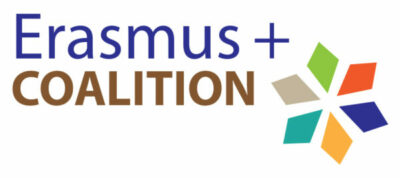Dr. Kallia Katsampoxaki-Hodgetts
Coordinator of Teaching and learning Centre TotT, University of Crete
Abstract
In this paper, I present theoretical models academics can use to design their syllabus and lessons upon reflecting on potential learning barriers and strategies and follow up proactive actions they can integrate into their teaching to increase opportunities for access, participation, and achievement of learning outcomes for all students without labelling. I also showcase appropriate systems that support all university students’ learning within a holistic inclusive framework following adaptations/adjustments of teaching and lesson design that ensures active involvement and student progress for all.
Key words: inclusive, academics as learners, university syllabus
Go to article - pdf
References
1.Armstrong, F. and Barton, L. (1999). Disability, Human Rights and Education. McGraw-Hill Education (UK)
2.Brennan, A. (2017). Exploring the Impact of a Professional Learning Community on Teacher Professional Learning for Inclusive Practice. Doctoral Thesis: Dublin City University Institute of Education.
3.Bunbury, S. (2020). Disability in higher education – do reasonable adjustments contribute to an inclusive curriculum?, International Journal of Inclusive Education, 24:9, 964-979, DOI: 10.1080/13603116.2018.1503347
4.Bovill, C., Cook-Sather, A., Felten, P., Millard, L., & Moore-Cherry, N. (2016). Addressing potential challenges in co-creating learning and teaching: Overcoming resistance, navigating institutional norms and ensuring inclusivity in student–staff partnerships. Higher Education, 71(2), 195–208. https://doi.org/10.1007/s10734-015-9896-4
5.Behling, K. T., & Tobin, T. J. (2018). Reach everyone, teach everyone: Universal design for learning in higher education. West Virginia University Press.
6.Carlson K., Ashford A., Hegagi M., Vokoun C. (2020). Peer Coaching as a Faculty Development Tool: A Mixed Methods Evaluation. J Grad Med Education.12(2):168-175. doi: 10.4300/JGME-D-19-00250.1. PMID: 32322350; PMCID: PMC7161339.
7.Carballo, R., Morgado, B., & Cortés-Vega, M. (2019). Transforming faculty conceptions of disability and inclusive education through a training programme. International Journal of Inclusive Education, 25, 843 – 859.
8.CAST (2011). “Universal Design for Learning Guidelines Version 2.0.” From:. http://udlguidelines.cast.org/binaries/content/assets/udlguidelines/udlg-v2-0/Udlg_fulltext_v2-0.doc
9.Cliffe, A., Cook-Sather, A., Healey, M., Healey, R., Marquis, E., Matthews, K. E., Mercer- Mapstone, L., Ntem, A., Puri, V., & Woolmer, C. (2017). Launching a journal about and through students as partners. International Journal for Students as Partners, 1(1).
10.Collins, A., Azmat, F., & Rentschler, R. (2019). ‘Bringing everyone on the same journey’: revisiting inclusion in higher education. Studies in Higher Education, 44(8), 1475-1487. DOI: 10.1080/03075079.2018.1450852
11.Cook-Sather, A. (2016). Creating brave spaces within and through student-faculty pedagogical partnerships. Teaching and Learning Together in Higher Education (18). Retrieved from https://repository.brynmawr.edu/tlthe/vol1/iss18/1
12.Davies, C., and T. Elliott. (2009). ICDS 1 Introductory Guide. University of Westminster.
13.Doyle, C., and K. Robson. (2002). Accessible Curricula: Good Practice for All. Cardiff: University of Wales Institute.
14.Doménech, A., Orozco, I., Lopez-Gavira, R. (2023). Recommendations about inclusive pedagogy for Spanish faculty members in the area of Social and Legal Sciences. International Journal of Educational Research, 117, 102116 https://doi.org/10.1016/j.ijer.2022.102116.
15.Dewsbury, B., & Brame, C. J. (2019). Inclusive teaching. CBE Life Sciences Education, 18(2). https://doi.org/10.1187/ cbe.19-01-0021
16.García-Campos, M. D., Canabal, C., & Alba-Pastor, C. (2020). Executive functions in universal design for learning: Moving towards inclusive education. International Journal of Inclusive Education, 24(6), 660-674.
17.Gardner, H., & Hatch, T. (1989). Multiple intelligences go to school: Educational implications of the theory of multiple intelligences. Educational Researcher, 18(8), 4-9.
18.Gibbs, P., P. Angelides, and P. Michaelides (2004). ‘Preliminary Thoughts on a Praxis of Higher Education Teaching.’ Teaching in Higher Education 9, (2): 183–194.
19.Gonzalez. L. & Ozuna, C. S. (2021). Troublesome knowledge: Identifying barriers to innovate for breakthroughs in learning to teach online. Online Learning, 25(3), 81-96. doi:10.24059/olj.v25i3.2641
20.Hockings, C. (2010). Inclusive learning and teaching in higher education: A synthesis of research. York: Higher Education Academy. Retrieved from http://www.heacademy.ac.uk/ourwork/teachingandlearning/inclusion/alldisplay?type=resources&newid=ourwork/inclusion/Inclusion_Research_Syntheses_Main_Page&site=york [Google Scholar]
21.Hockings, C. Brett P. & Terentjevs M. (2012). Making a difference—inclusive learning and teaching in higher education through open educational resources, Distance Education, 33:2, 237-252, DOI:10.1080/01587919.2012.692066
22.Katsampoxaki-Hodgetts, K. (2022a). The “naked” syllabus as a model of Faculty education: is this the missing link in Higher Education?. International Journal of Academic Development. https://doi.org/10.1080/1360144X.2022.2025814
23.Katsampoxaki-Hodgetts, K. (2022b). Faculty considerations for inclusive teaching & learning in HE. Hybrid International Workshop for COALITION Erasmus + HighEd programme (06/12/2022), Leiden University.
24.Lindsay, G. (2007). Educational psychology and the effectiveness of inclusive education/mainstreaming. British Journal of Educational Psychology, 77, 1–24. DOI:10.1348/000709906X156881
25.Matthews, N. 2009. “Teaching the ‘Invisible’ Disabled Students in the Classroom: Disclosure, Inclusion and the Social Model of Disability.” Teaching in Higher Education 14 (3): 229–239. doi: 10.1080/13562510902898809
26.Moriña, A. (2020). Faculty members who engage in inclusive pedagogy: Methodological and affective strategies for teaching Teaching in Higher Education, 27 (3) (2020), pp. 371-386, 10.1080/13562517.2020.1724938
27.O’Leary, E.S., Shapiro, C., Toma, S. et al. Creating inclusive classrooms by engaging STEM faculty in culturally responsive teaching workshops. IJ STEM Ed 7, 32 (2020). https://doi.org/10.1186/s40594-020-00230-7
28.Oliver, M. & Barnes, C. (2010). Disability studies, disabled people and the struggle for inclusion, British Journal of Sociology of Education, 31:5, 547-560, DOI: 10.1080/01425692.2010.500088
29.Parker, M., Patton, K., & O’Sullivan, M. (2016). Signature pedagogies in support of teachers’ professional learning. Irish Educational Studies, 35(2), 1-17. https://doi.org/10.1080/03323315.2016.1141700
30.Reeve, J. (2009). Why teachers adopt a controlling motivating style toward students and how they can become more autonomy supportive. Educational Psychologist, 44, 159–178.
31.Rajala, A., Kumpulainen, K., Rainio, A.P., Hilppö, J., & Lipponen, L. (2016). Dealing with the contradiction of agency and control during dialogic teaching. Learning, Culture and Social Interaction, 10, 17–26.
32.Swanson, H. L., & Deshler, D. (2003). Instructing adolescents with learning dis-abilities: Converting a metaanalysis to practice. Journal of Learning Disabilities, 36, 124–135.
33.Tennenberg, J. (2014). Learning through observing peers in practice. Studies in Higher Education, 41 (4): 756-773.
34.Tinklin, T., Riddell, S., & Wilson, A. (2004). Policy and provision for disabled students in higher education in Scotland and England: The current state of play. Studies in higher education, 29(5), 637-657.
35.Vygotsky, L. S. (1978). Mind in society: The development of higher psychological processes. Cambridge, MA: Harvard University Press.
36.Whittaker, J. A., & Montgomery, B. L. (2014). Cultivating institutional transformation and sustainable STEM diversity in higher education through integrative faculty development. Innovative Higher Education, 39, 263–275. https://doi.org/ 10.1007/s10755-013-9277-9.
37.Wiggins, G., & McTighe, J. (2006). Understanding by design (2nd ed.). Upper Saddle River, NJ: Prentice Hall.
38.Zhidong B. (2012). An Exploration of the Driving Force Behind Teacher Resistance to Curriculum Change. In: Chen S., Kompf M. (eds) Chinese Scholars on Western Ideas about Thinking, Leadership, Reform and Development in Education. Critical Issues in the Future of Learning and Teaching, 7, SensePublishers, Rotterdam. https://doi.org/10.1007/978-94-6209-010-1_14
39.Zepke, N., Leach, L., & Butler, P. (2010). Student engagement: What is it and what influences it? Teaching & Learning Research Initiative. Wellington, N.Z.: Teaching and Learning Research Initiative. Retrieved from http://www.tlri.org.nz/ sites/default/files/projects/92 [Accessed on 01/06/2023]

